Street sweeper (occupation)
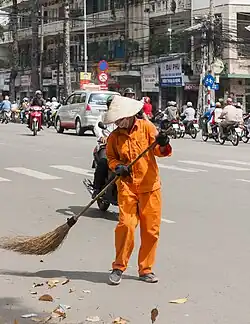
A street sweeper or street cleaner,[1] generically, is a municipal employee, [2] of a private company, dedicated to sweeping the streets and gardens, collecting papers, fallen leaves, cleaning graffiti, etc. in order to keep the streets and public spaces clean.[3]
Activity
The street sweeper's work includes two distinct types of activity: manual cleaning, using a broom, dustpan and trolley, especially in pedestrian areas, sidewalks and parks, and mechanical cleaning, using motorized sweepers, leaf blowers and brigade vehicles that cover large areas and transport light waste. These tasks are carried out regularly and in a coordinated manner, and may include the removal of fallen leaves, dust, sand, small urban waste and plant debris. [4]
Characteristics
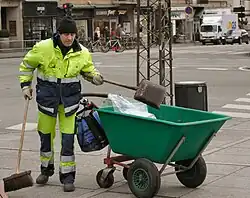
Due to the nature of their work, street sweepers are exposed to traffic and weather conditions, so specific protective clothing such as gloves, safety footwear and high visibility vest is mandatory. [5] Among the duties of the street sweeper may also be the removal of solid urban waste. [6] [7]
Denomination
Despite the fact that the occupation of street sweeper constitutes an essential and necessary task for the normal functioning of communities, [8] the very characteristics of the profession and the low qualifications [9] required for its performance have generated a certain stigmatization of the group. [10] For this reason, social institutions have adopted aseptic or euphemistic names [11] in an attempt to correct the affront by replacing the term street sweeper with periphrases such as "Municipal cleaning worker", "Street cleaning operator", [2] [12] "Public space cleaner", [13] "Street cleaning specialist", [9] even going so far as to develop more bombastic ones such as "urban hygienists". [14]
Street sweepers "in the movies"
- Laurel and Hardy star in the 1940 film A Chump at Oxford . Stan and Ollie are two street sweepers who, while taking a lunch break outside a bank, accidentally thwart a robber's escape.
- The Three Stooges play, in the 1941 short film So Long Mr. Chumps, three street sweepers who, while on the job, find some loot and search for its owner to return it.
- In 1967 , José Luis López Vázquez played the protagonist of A Million in the Trash, a street sweeper who finds a million pesetas in a trash can.
- Mario Moreno stars in El barrendero, a 1981 film, in which he plays a street sweeper who witnesses the theft of a painting that the thieves hide in a garbage can.
Gallery
-
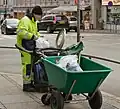 Street sweeper emptying the city's trash cans
Street sweeper emptying the city's trash cans -
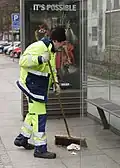 Street sweeper at the bus stop in Parkallé in Aarhus
Street sweeper at the bus stop in Parkallé in Aarhus -
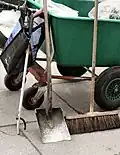 Street sweeper's tools: A paper clip, a shovel, a brush and the cart
Street sweeper's tools: A paper clip, a shovel, a brush and the cart
See also
References
- ^ "Definition of STREET CLEANER". Merriam-Webster. 2024-08-05. Retrieved 2025-08-17.
- ^ a b "Un servicio con historia" (PDF). Fichas exposición Servicios de limpieza municipales. Retrieved 2025-08-17.
- ^ Angosto, Pedro Luis (2024-08-29). "Limpiadores, barrenderos y basureros". Nuevatribuna (in Spanish). Retrieved 2025-08-17.
- ^ "Equipamiento". 2022. Retrieved 2025-08-17.
- ^ "Manual ed seguridad y salud en empresas de limpieza viaria y recogida de residuos sólidos urbanos" (PDF). 2023. Retrieved 2025-08-17.
- ^ "Barrenderos" (PDF). pp. 1–6. Retrieved 2025-08-17.
Misión: Los barrenderos barren y limpian calles, parques, aeropuertos, estaciones y otros lugares públicos y privados (...) Funciones: Barrer calles, parques, aeropuertos, estaciones y otros lugares públicos similares. (...) Recoger residuos urbanos.
- ^ "La Secretaría de Obras y Servicios reconoce a los trabajadores del sistema de limpia de la ciudad de México". 2019. Retrieved 2025-08-17.
Cada día los barrenderos recolectan en promedio 720 toneladas de residuos sólidos urbanos a lo largo y ancho de la Ciudad de México.
- ^ "Este es el sorprendente sueldo de un barrendero en España". El Diario. 2022. Retrieved 2025-08-17.
- ^ a b "Peón especialista para el servicio de limpieza viaria". Retrieved 2025-08-17.
- ^ Tizziani, Ania (2022). "El "trabajo sucio" de las ciudades. Condiciones y experiencias laborales de los trabajadores de limpieza urbana en la Ciudad de Buenos Aires" (PDF). Trabajo y sociedad (Caicyt-Conicet). 23 (38). Santiago del Estero, Argentina: 449–463. ISSN 1514-6871. Retrieved 2025-08-17.
- ^ Gómez Sánchez, María Elena (2006). "Cortesía y eufemismo: los sustitutos eufemísticos en la prensa y la defensa de la propia imagen". Discurso y sociedad: contribuciones al estudio de la lengua en contexto social: 624–636. ISBN 8480215380.
- ^ "La Importancia del Operario de Limpieza Viaria en Nuestras Ciudades". 2025. Retrieved 2025-08-17.
- ^ Luque Nadal, Lucía (2022). "La reflexión metalingüística como recurso humorístico en el discurso televisivo". Revista de Investigación Lingüística (25). ISSN 1989-4554. Retrieved 2025-08-17.
- ^ "Limpiadores, barrenderos y basureros". Nueva Tribuna. Público. 2025. Retrieved 2025-08-17.